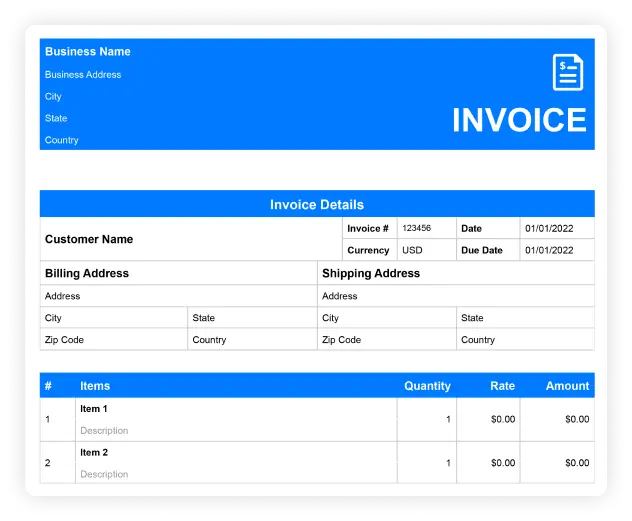Proforma Invoice Format
A proforma invoice template is used as a preliminary bill of sale before goods or services are delivered, giving clients an overview of charges.
- Provides a preliminary overview of costs.
- Includes itemized products/services with estimated pricing.
- Helps confirm sales agreements before final invoicing.

Download Customizable Proforma Invoice Format
Create Your First Customize Proforma Invoice Template With CaptainBiz
What Should Be Included in Proforma Invoice Template
Client and Vendor Information:
Clearly state the client’s name, contact details, and the vendor’s business information to ensure proper communication.
List of Goods or Services:
Provide a detailed description of the products or services being offered, including quantities, unit prices, and any applicable discounts.
Proforma Invoice Number and Date:
Assign a unique proforma invoice number and include the date of issue to ensure easy tracking and reference for both parties.
Estimated Total Cost:
Summarize the total cost, including applicable taxes and fees, so clients are fully informed before the final purchase.
Terms of Sale:
Outline the payment terms, shipping details, and delivery date, allowing both parties to agree on the transaction’s specifics.
Special Instructions or Notes:
Include any special notes related to the agreement, such as custom orders or specific client requirements.
So what are you waiting for?
Frequently Asked Questions (FAQs)
A proforma invoice template is a pre-invoice document outlining the products/services offered and their estimated costs. It acts as a quote before the final invoice is issued.
It is used when a buyer wants a detailed cost breakdown before finalizing the sale, helping them review the agreement before moving forward.
No, a proforma invoice is not legally binding. It is a pre-invoice document that serves as a quote for the buyer's approval.
Yes, proforma invoices can be customized to include industry-specific terms, products, or services, making them flexible for various businesses.
It helps businesses and clients align expectations, reducing disputes by outlining costs and terms upfront before the final sale.



